
The control room is the central place of a plant where the process is monitored and controlled. An efficient control room is one of the most important factors for a well- managed optimized and safe production with the lowest possible emissions. There are many different factors influencing how well the control room and hence the plant operates.
The design of a control room involves many different aspects such as sound, lightning, ergonomics as-well as the human factors. This is critical and covered by the ISO 11064 part 1-7 and also closely linked to the HMI of operator screens and alarm management.
Kairos Control Room Assistant is all about assisting the control room operator when the complex situations occur. Supporting the situational awareness and a rational decision-making process. Ensuring knowledge is captured and shared between the control room operators
Industry studies show that industrial plants lose between 3-8 % of their production profit due to unplanned upsets or abnormal events.
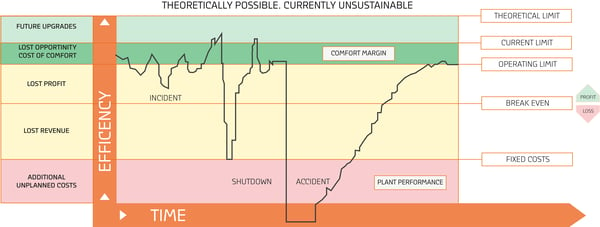
Incidents consist in brief excursions from the operational target or interruptions in production due to unplanned shutdowns. More than 50% of these incidents happen due to a lack of situational awareness.
What is the definition of an unplanned upset or abnormal situation for a production facility?
Any unplanned and undesired event that prevents completion of a task causing a risk to health, safety, production or environment. The cause may be blockage of a pipe, failure of an instrument, and similar. These kinds of unplanned and undesired events cannot be handled by the control and safety systems alone and require human intervention by a control room operator to return to a normal state.
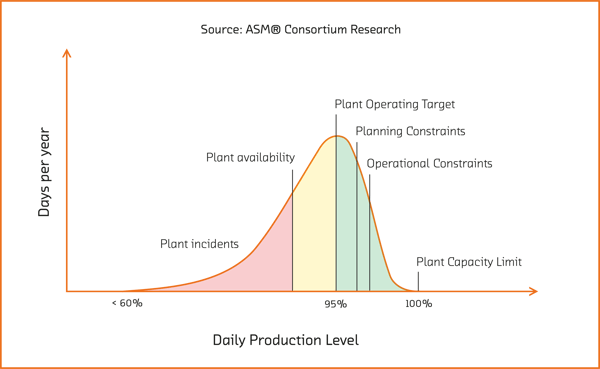
Seen from the operator’s perspective, the number of information points have increased significantly over the last few years, due to more integrated and advanced systems. Simultaneously, the number of operators for each loop has decreased.
This is the Situational Awareness challenge: Interpreting an ever-growing stream of information correctly and timely in an increasingly complex context.
Management of situations in complex system involves two overall phases of decision-making, each with a number of subtasks.
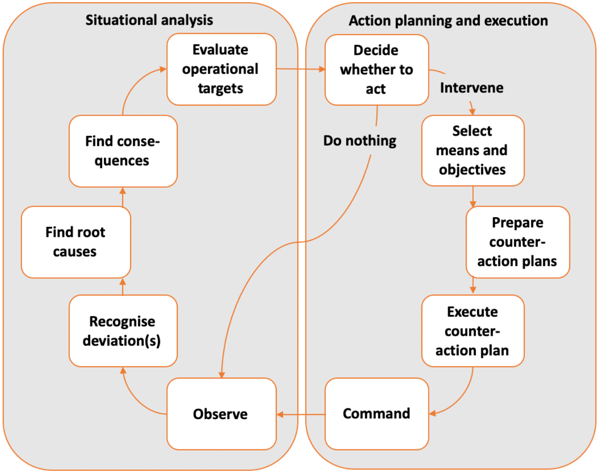
(Source: DTU Electro)
Rational decision making starts with access to observable information from the plant and the ability to recognize and analyse a deviation from normal operation. This includes the identification of possible root causes and prediction of consequences of the disturbance. Furthermore, the possible consequences are evaluated in view of the operational targets to determine if counteraction is needed. If a decision to act is taken, the next decision is to select the means and objective of counteraction, to prepare a plan, and finally to execute the plan.
Humans tend to bypass these principles of rational decision-making by making shortcuts in the sequence.
The shortcut is an efficient way to act in situations that have been seen often before. The human recognises the pattern and swiftly moves to the appropriate action. But in other less frequent situations, the lack of informed decisions can lead to suboptimal operation, and even to shutdowns or disaster. The pattern was perhaps not quite the same, or could be completely new, and as such the shortcut taken by the operator was ineffective due to cognitive bias or lack of knowledge.
This is why we have developed Kairos Control Room Assistant, which assists operators with situational awareness through the entire rational decision-making process.
The type of work tools offered to the control room operator for monitoring and control has not been updated for decades. Today, we provide maybe as much as 50 000 configured alarms and 500 process graphics along with time-based trending of individual process sensors for an individual site. In addition, we know that following a rational decision-making process is not natural for human beings. The constant strives to reduce operational cost is driving a decrease in the number of operators in the control rooms, thereby adding more sensors, processes, and systems to one operator.
There has been a trend over the past few years to introduce human centric design, where human factors are being considered when designing the control rooms. This is positive, but the underlying problems have not been resolved. We are still dependent on the expertise of each individual control room operator when dealing with process upsets.
The basic tool for attracting the control room operator’s attention when deviations are developing, is alarms. The automation in the control system should handle normal control. When a process sensor moves outside of safe operating level, without the control system managing control, the alarm notifies the operator that an action is required. The notification should be given sufficiently early to leave time for the operator to analyze cause and plan counter actions. Safety systems will take over if the operator also fails to control the deviation.
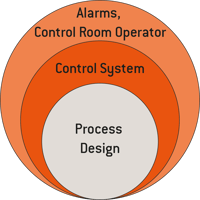
The are many problems and challenges when it comes to alarms. The basics with oversimplification of the alarm system where one sensor = one alarm = one symptom, is that it often causes more challenges than help, and much is left to the individual operators’ skills and experience.
With the tools we currently offer to help understand the situation as a control room operator, it is necessary to ask: what's the cause behind the symptom or the alarm, what are the consequences, and how do I respond? Today, we don't really have any tools that can support the operator in these areas, as they rely on the operator’s own knowledge and experience. Is that good enough?
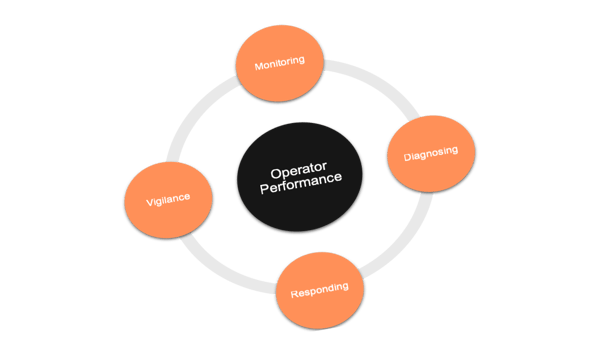
Our vision with Kairos - Control Room Assistant is to use a combination of the critical sensors to identify root causes, predict consequences, and suggest mitigation plans to create A Future Without Alarms.
Control room operators require specialist expertise to be able to run a plant as efficiently as possible. This is obvious, as most plants operate perfectly well within the operating limits automatically with no operator. It is when the automatic systems fail that the operator needs to intervene. We have been discussing the challenge of situational awareness and cognitive bias. Let us explore other parts of the optimization equation: experience, skills, and knowledge sharing.
Being a part of a plant’s design and commissioning is one of the best ways to learn how to operate the plant. The commissioning phase will most likely include lots of situations with start-up and shutdown, which are normally not encountered during stable operation. The paradox with conventional learning is that disturbances are required in order to build the experience needed to manage difficult situations. At the same time, we must avoid disturbances to have an emission free, safe, and optimized production.
Training programs for operators often include the use of operator training simulators (OTS), where they can practice operating the plant through different scenarios. This is one of the best ways to build up individual skills for scenarios that have not yet occurred.
We believe there is a way of sharing these individual skills gained from commissioning, operation, and OTS sessions.
Our technology is based on a branch of Artificial Intelligence called Qualitative Physics. The goal of Qualitative Physics is to capture and reason, based on experience (common knowledge) and tacit quantitative knowledge from design often used by engineers. Our process knowledge digital twins are functional models called MFM (Multilevel Flow Model) process models.
We capture and share both the explicit knowledge from design and enrich with the experience from the control room operators and other operational personnel with in-depth experience of running the plant. Key lessons from HAZOPs and root cause analysis can be included in the model. This is combining the best of two worlds – hard facts & experience. Our product, Kairos Control Room Assistant, streams process variables to select what knowledge is relevant and puts it in front of the control room operator in milliseconds.
The advantage of functional modelling is that it allows to decompose the plant in unit functions that are generic. Our library of generic functions represents state-of-the-art knowledge and allows us to deploy any new insights to all our Digital Twins, so all of our clients can benefit from it.
This is what we call knowledge sharing.
Kairos Technology is a software company that develops innovative and disruptive technology within the energy industry.
Phone: +47 952 91 478
E-mail: info(a)kairostech.no
Address Norway:
Kanalsletta 4, N-4033 Stavanger
Address Denmark:
DTU Science Park, Diplomvej 381, DK-2800 Lyngby